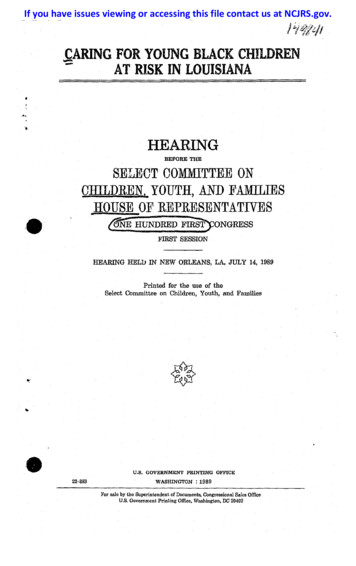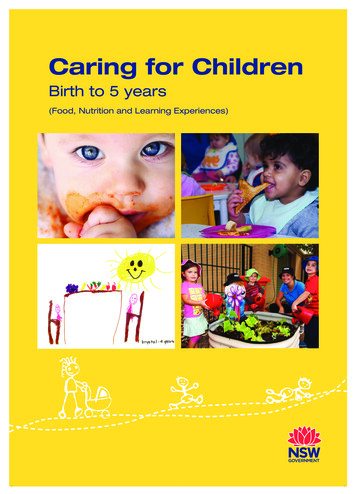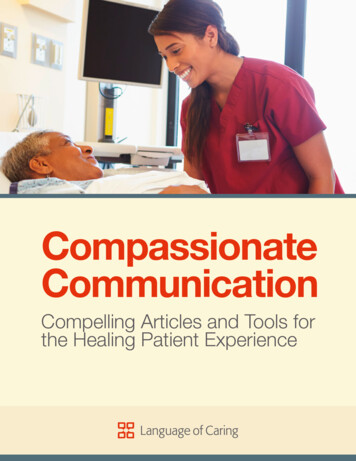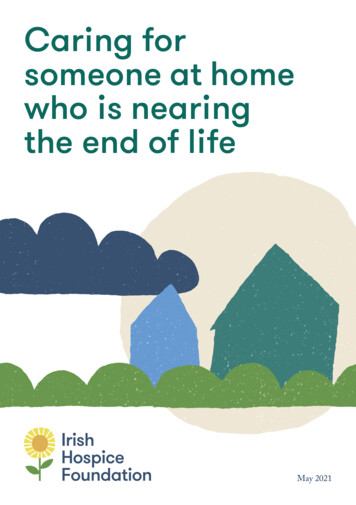
Transcription
If you have issues viewing or accessing this file contact us at NCJRS.gov.CARING FOR YOUNG BLACK CHILDREN- AT RISK IN LOUISIANA'.HEARINGBEFORE THESELEOT OOMMITTEE ONOJilLDREN YOUTH, mJ FAMlLIESHOUSE OF REPRESENTATIVES-@E HUNDRED FI:RSTyONGRESSFIRST SESSIONHEARING HELD IN NEW ORLEANS, LA, JULY 14, 1989Printed for the use of theSelect Committee on Children, Youth, and Families.'.u.s. GOVER1'fMENT PRmTJlllG OFFICE22-383WASHmGT01'f : 1989For sale by the Superintendent of Documents, Congressional Sal"" OfficeU.S. Govemment Printing Office, WOBhington, DC 20402
r.'SELECT COMMITrEE ON CHILDREN, YOUTH, AND FAMILIESGEORGE MILLER,WILLIAM LEHMAN, FloridaPATRICIA SCHROEDER, ColoradoLINDY (MRS. HALE) BOGGS, LouisianaMATTHEW F. McHUGH, New YorkTED WEISS, New YorkBERYL ANTHONY, JR., ArkansasBARBARA BOXER, CaliforniaSANDER M. LEVIN, MichiganBRUCE A. MORRISON, ConnecticutJ. ROY ROWLAND, GeorgiaGERRY SIKORSKI, MinnesotaALAN WHEAT, MissouriMATTHEW G. MARTINEZ, CaliforniaLANE EVANS, DlinoisRICHARD J, DURBIN, DlinoisDAVID E. SKAGGS, ColoradoBILL SARPALIUS, TexasCalifornia, ChairmanTHOMAS J. BLILEY, JR., VirginiaFRANK R. WOLF, VirginiaBARBARA F. VUCANOVICH, NevadaRON PACKARD, CaliforniaJ. DENNIS HASTERT, lllinoisCLYDE C. HOLLOWAY, LouisianaFRED GRANDY, IowaCURT WELDON, PennsylvaniaLAMAR S. SMITH, TexasPETER SMITH, VermontJAMES T. WALSH, New YorkRONALD K. MACHTLEY, Rhode Island CoMMITl'EE STAFFANNROSEWATER,Staff DirectorDENNIS G. SMITH, Minority Staff DirectorCAROL M. STATUTO, Minority Deputy Staff DirectorCIIl149841U.S. Department of Justl.ceNational Institute of JusticeThis document has been reproduced exactl as rec i ed from I eperson or organization originaling il. Points of view or oplOl ns ,slaled InIhis document are those of Ihe authors an.d do not ecessanly r:lpresentthe official pOl;ition or policies of the National Institute of Justice.Permission to reproc!uce this1I!i)'material has beengra '\1 lic Domain/101st congr ssS House of RepyesenLaU:vesu. .to Ihe National Criminal Justice Reference Service (NCJRS).Further reproduction oulside 01 the NCJRS system requires permissionof the owner.
CONTENTSPage . Hearing held in New Orleans, LA, July 14, 1989 . .Statement of:Alexander, Nancy P., executive director, Child Care Services, Inc. ofNorthwest Louisiana and Louisiana representative and public policyliaison, Southern Association on Children Under Six, Shreveport, LA . .Bagert, Hon. Ben, senator, Louisiana State Senate, New Orleans, LA . .Bromon, Emma B., executive director, National Council of Negro, Womenof Greater New Orleans, Inc., New Orleans, LA . .Broussard, Marsha, executive director, Louisiana Primary Care Association, Baton Rouge, LA . .Cook, Dr. Samuel Dubois, president, Dillard University, New Orleans, LADaigle, Lieutenant Teddy, operations commander, juvenile division, NewOrleans Police Department, New Orleans, LA . .Eddington, Dr. Herbert H., former chairman, Board of Pardons, State ofLouisiana, former board member, NAACP and former board member,Greater New Orleans Urban League, New Orleans, LA . .Elloie, Pearlie H., director, Office for Children, Youth, and Families,Total (',ommunity Action, Inc., New Orleans, LA . .Emelle, Barbara C., instructional specialist, New Orleans public schools,New Orleans, LA . .Gilbert, Linetta J., director, social services, Housing Authority of NewOrleans and president, Louisiana Aseociation for the Education ofYoung Children, New Orleans, LA . .Kabacoff, Pres, chairman, New Orleans Council for Young Children inNeed and chairman, Orleans Parish School Board Early InterventionTask Force, New Orleans, LA . .Kaiser, Michael, M.D., director, Pediatric AIDS Program, Children's Hospital, New Orleans, LA. .Robins, Merline, parent and peer tutor with the home instruction program for preschool youngsters, New Orleans, LA .Rondeno, John, member, board of directors, Dryades Street YMCA andmember, board of directors, Desire Community Center, New Orleans,LA . .Prepared statements, letters, supplemental materials, et cetera:Alexander, Nancy P., executive director, Child Care Services, Inc. ofNorthwest Louisiana and public policy liaison and Louisiana representative to Southern Association on Children Under Six, Shreveport, LA,prepared statement of . .Bagert, Hon. Ben, senator, Louisiana State Senate, New Orleans, LA,prepared statement of . .Bebelle, Carol F., coordinator of Special Administrative Services, NewOrleans Health Department, New Orleans, LA, prepared statement of.Boggs, Hon. Lindy, a Representative in Congress from the State of Louisiana, opening statement of. . .Bromon, Emma B., executive director, National Council of Negro Womenof Greater New Orleans, Inc., New Orleans, LA, prepared statement of.Broussard, Marsha, executive director of the Louisiana Primary CareAssociation, Baton Rouge, LA, prepared statement of. . .Cameron Eleanor W., president, Cameron College, New Orleans, LA submitting a letter to Jill Kagan, and Howard Penderhughes, dated July28, 1989 .Daigle, Lieutenant Teddy, juvenile division, New Orleans Police Department, New Orleans, LA, prepared statement of . 8116
IVPagePrepared statements, letters, supplemental materials, et cetera--00ntinuedDavis, Maudelle W., assistant executive director, Kingsley House, NewOrleans, LA, prepared statement of--00ntinuedEddington, Dr. Herbert H., owner and attending physician of the Canal/Claiborne Chiropractic Center, former board member-New OrleansUrban League, former board member-New Orleans NAACP, formerpresident-Alliance For Good Government. former chairman-Louisiana State Pardon Board, New Orleans, New Orleans, LA, preparedstatement of. .Elloie, Pearlie, director, Office for Children, Youth, and Families, TotalCommunity Action, Inc., New Oileans, LA, prepared statement of. .Emelle, Barbara C., instructional specialist, New Orleans Public Schools,New Orleans, LA, prepared statement of . .Gilbert, Linetta J., director of social services, Housing Authority of NewOrleans, New Orleans, LA, prepared statement of. . .Holloway, Clyde C., a Representative in Congress from the State of Louisiana, prepared statement of . .Kabacoff, Pres, businessman, lawyer, real estate developer, New Orleans,LA, prepared statement of.Kaiser, Michael M.D., F.A.A.P., director, Pediatric AIDS Program, Children's Hospital, New Orleans, LA, prepared statement of . .Lee Lydia, VISTA/AGENDA for Children, letter to Howard Pinderhughes dated, June 17,1989 . .Lutz, Brobson, M.D., M.P.H., director of Health, and Sheila J. Webb,R.N., M.S. deputh director of Health, New Orleans, LA, prepared statementof . .Miller, Han. George, a Representative in Congress from the State ofCalifornia and Chairman, Select Committee on Children, Youth, andFamilies:"Caring For Young Black Children at Risk in Louisiana" (a factsheet) . .Opening statement of. .National Council of Jewish Women, Home Instruction Program for Preschool Youngsters, prepared statem'ilnt of. .Perrault, Dorothy Jacques, president, Perrault Kiddy Kollege, NewOrleans, LA, prepared statement of . .Robins, Merline, parent and peer tutor with the 40me instruction program for preschool youngsters, New Orleans, LA, prepared statementof. .Rondeno, John T. Jr., president of Families Active In Total Health, Inc.New Orleans, LA, prepared statement of. .6860724410191031701724316221615129.
CARING FOR YOUNG BLACK CHILDREN ATRISK IN LOUISIANAFRIDAY, JULY 14, 1989HOUSE OF REPRESENTATIVES,SELECT COMMITTEE ON CHILDREN, YOUTH, AND FAMILIES, Washington, DC.The Committee met, pursuant to notice at 9:30 a.m. in theKearny Hall Lounge, Dillard I.Jniversity, New Orleans, Louisiana,Honorable George Miller (Chairman of the Committee) presiding.Members present: Representatives Miller, Boggs and Holloway.Staff present: Ann Rosewater, staff director; Jill Kagan, professional staff, Howard Pinderhughes, professional staff; Carol Sta·tuto, minority deputy staff director.Chairman MILLER. The Select Committee on Children, Youth,and Families will come to order. I am Congressman George Miller,the Chairman of the Select Committee and I want to say howpleased I am that the-[Applause.]Chairman MILLER [continuing]. How pleased I am to bring myown cheerleader, Mrs. Boggs-but how pleased we are as membersof this Committee, to be here today and to be here in conjunctionwith Dillard University's National Conference on Minority ChildCare and Family Issues, a conference that we think is very impor·tanto We were honored to be invited to participate, and we are notonly looking at the results of this hearing today, but also all of theother papers that have been presented during the Conference tohelp the Select Comm.ittee as we struggle with the issues of con·cern to minority families and as we struggle to try to get the Con·gress to become more enlightened and more understanding of theproblems that these families confront in today's society.Let me say at the outset that in spite of all the invitations, thehundreds that we get on a monthly basis at the Select Committee,we would not be here without Mrs. Lindy Boggs.[Applause.]Chairman MILLER. She insisted, when she first heard of this Conference, thatwe participate and that we make sure that we understand the importance of this Conference. It was a close race, I musttell you, I guess you could say it was a photo-finish in the horserace because then came Clyde Holloway, who said there is onething this Select Committee is going to do if I am going to keepcoming to these meetings, and that is we are going to the DillardConference .[Applause.](1)
2Chairman MILLER. They both have shown a great deal of-let usstop this applause for a minute, okay? [Laughter.]They have both shown a great deal of wisdom, because there is agreat deal of concern on our Committee as we have sat and takentestimony and as we have struggled in the legislative arenas to seehow to address the issues that confront minority families, and howto confront the issues of child care.I have to tell you, for those of you that do not know, this Committee is everybody's third Committee, and you have to volunteer.We do not draft you, we assume that if you want to be on this Committee, you are concerned about the future of America's childrenand we expect you to participate. Clyde Holloway is among ournewest members to the Committee, and he has been a stalwart interms of coming to our hearings, listening to the testimony, reacting to that testimony and acting in the legislative arena.When we get all done with our views, we then have to turn toMrs. Boggs, because she has the purse strings and it is not just herpurse-she is t:uking about the nation-:-we are talking about a realpurse here. ShE:: has just fmished a week of ma.rking up legislationin her subcommittee on appropriations on housing and urban development and on the programs of foster care and child abuse andall of the social service and education programs that the Congresswill be debating in the coming weeks.I think that Louisiana can give us special insight into what ishappening with respect to the problems of child care and to theeconomy and the stress that this places on families; what it meansto languish at the poverty level and not to have the kinds of services that we saw this morning at Kingsley House, where we sawfamilies that were confronting crises, in many instances crises thatwere not of their own making. A few services could leverage thatinto success for themselves, for their children, for their employment opportunities. And I think once again we witness the factthat child care can be a very real tool in helping the success offamilies. It allows people to seek out training, it allows people toseek out employment, in some instances allows' us to stop childabuse and allows families a little bit of respite, a little bit of timeto take stock of where they are in many instances in terrible pressing economic situations. And that is what we hope we will be ableto build on here today.We are also very honored to be joined on the panel this morningby Mrs. Effie Barry, who is the wife of the Mayor of Washington,D.C., Marion Barry. Mrs. Barry has worked long and hard in theseprograms at Children's Hospital National Medical Center in Washington, D.C. Again, this Conference has attracted such attentionthat she has joined us here today expressly at the direction of Children's Hospital because these are problems that confront every institution. All too often, as Mrs. Barry knows, our hospitals getthese children when it is almost too late, and when they are themost expensive children that we can encounter in this country.And what we hope to be able to learn here today is how we canavoid that.[Opening statement of Congressman George Miller follows:]
3OPENING STATEMENT OF HON. GEORGE MILLER, A REPRESENTATIVE IN CONGRESSFROM THE STATE OF CALIFORNIA AND CHAIRMAN, SELECT COMMITTEE ON CHILDREN,YOUTH, AND FAMILIES I am pleased to bring the Select Committee on Children, Youth, and Families toNew Orleans to address the needs of young black children at-risk in Louisiana inconjunction with Dillard University's National Conference on Minority C'nild Careand Family Issues. Let me give special thanks to my colleague on the Select Committee, Congresswoman Lindy Boggs, a long-time mentor and advocate for childrenin Congress and in this State. Without her invitation and assistance, we would notbe in New Orleans today.Major policy improvements for children are now being considered in the Congress,and this timely hearing will bring to our deliberations useful insight into the specialneeds of the thousands of Louisiana's young black children who live in urban andrural poverty. In addition, this hearing will explore selected public and privatesector initiatives which show promise in bringing opportunity for a healthy startand continued healthy development for these children and their families.The increasing number of children born into poverty is one of the most alarmingtrends examined by this committee over the last six years. Tragically, the oil busthas taken an added toll-economically and in many other ways-on this state's children and their families. Louisiana's unemployment rate has remained high even inthe face of eight years of "economic recovery" in the nation. New Orleans alone hasone of the highest unemployment rates among all our nation's cities.Economic supports for the lowest income women and children are limited at best.Given the many competing claims on the state's strained budget, Louisiana's publicassistance program provides an income that is less than one-third of the federal poverty level.As a result of severe economic strife, increasing numbers of young black childrenin Louisiana are at risk of infant death and disabilit.y, ' rug addiction, arrested development, low academic achievement, chronic md serious illnesses, includingAIDS, child abuse, and violence. Unless early and cl mprehensive steps are taken,these are the children who become prime candidates for chronic welfare dependency, homelessness and crime.For many children, the road to school failure and ill health begins at birth. Infantmortality claims a terribly high proportion of babies in the state. Among black infants, the rate of 17 deaths per 1,000 births is t\\ice that of white infants.This committee has documented that the problems of infant mortality and lowbirthweight could be prevented with early, comprehensive prenatal care. Yet, in1986, less than half of all pregnant black women in Louisiana received adequateprenatal care, the key to overcoming these problems.We will also hear today that in New Orleans, which has more people per capitaliving in public housing than any other city in the nation, at least one out of fiveunits are substandard and unsafe. Such precanous environments compound therisks to the 10,000 low-income children under age 6 in this city who reside in publichousing.One of the Select C-ommittee's most striking rmdings is the courage and tenacityof low-income and minority families who struggle daily to overcome these odds,regain their economic independence and provide the best beginnings for their children. For them, quality child care has become as essential as food, housing andhealth care. Yet, 9,000 Louisiana children remain on a wai.ting list for state subsidized child care. In some areas of the state, there is no subsidized child care at all.It is not that we lack the knowledge to prevent many of the problems confrontingyoung black at-risk children and their parents. Effective prevention and intervention efforts offering preventive health care, child care and early childhood development, as well as home-, community- and school-based parenting education and counseling, are working to offset the enonnous obstacles which these young childrenface.This morning we had the opportunity to visit Kingsley House and observe firsthand a model for community action that offers in one location comprehensive services for families at greatest risk-referral services, Head Start, child care, and evena family preservation program to help troubled families stay together. Programs3uch as these reach only a fraction of the children who need help.Let me welcome the assembled state legislators, doctors and health care professionals, prominent business leaders, child care providers, social service providers,community activists and parents who will testify today. Thank you for the contribution your participation will make to our efforts in Congress on behalf of children.
4wCtuing fOr Young Black Children at Risk in LouisianaWAFACfSHEETLOUISIANA'S ECONOMIC CRISIS TAKES TOLL ON CHILDRENAND FAMILIES**Between 1984-1989, the national un.employment rate dropped from7.6% to 5.1%. In Louisiana, the unemployment rate remainedconstant at 9.6% throughout these years. (U.S. Department ofLabor, 1989)**Between 1981-1985, tbe annual J1er capita income increasednationally at an average rate of 6%, while in Louisiana, per capitaincome decreased at about 1% annually. (Congressional ResearchService [CRS], 1989; Southern Growth POlicy Board [SGPB],1989)**In 1985, 18% of Louisiana's population lived in poverty, theeighth highest poverty rate in the country. In 1987, 25,000children (45%) ages 0-5 in Orleans Parish lived below 145% ofthe federal p'overty line ( 16,893 for a family of four). (Center onBudget and Policy Priorities, 1988; New Orleans Council fOiYoung Children OCYC], 1988)**In 1988, the maximum AFDC payment level for Louisiana familieswith no other income was only 24% of the federal poverty level( 11,650 for a family of four) and 30% of the state's .AFDCstancilrd of need. (Children's Defi;lnse Fund [CDFj, 1989) GROWING l'rrJMBER OF CHILDREN AT-RISK IN LOUISIANA**While the number of children being born annually in Louisianadeclined between 1982-1987, the proportion of nonwhite birthsincreased from 38% to 42% of the total. (NOCYC, 1988;Louisiana Department of Health and Hospitals [LDHH], 1989)**Between 1982-1986, the percentage of babies born in OrleansParish who were nonwhite increased from 72% to 78% of all livebirths. (NOCYC, 1988)**In 1986, alm.ost 17% of infants born in Louisiana were born towomen under age 20; almost one-fourth of all black babies in
5Lomsiana were born to teen mothers. Similarly, in 1987, birthsto teens in Orleans Parish accounted for almost one out of fivebirths. (CDF, 1989; LDHH, 1989)**In 1986, among southern states, Louisiana had the third highestbirth rate for girls aged 10-14 (2.4/1,000), and for teens aged 1517 (45.2/1,000). (Southern Regional Project on Infant Mortality[SRPIM], 1989)CHILD CARE LIMITED AND OF UNCERTAIN QUALITY **Between FY 1985-FY 1987, child care funding under the Title XXSocial Services Block Grant decreased in the state from 13.4million to 7.54 mi11ion, and the number of children serveddeclined from 7,830 to 6,554. (Bank Street College [Bsq, 1988)**There are currently over 9,000 children in Louisiana on a waitinglist to receive state subsidized child care; almost 6,000 of thesechildren are in Orleans Parish.(NOCYe, 1988; personalcommunication with Robinson, 1989)**Among the 10,000 children ages 0-5 who live in public hOUSing inNew Orleans, child care is available for only 30%. (Gilbert, 1989)**Over half of the administrators of child care programs inLouisiana who responded to a Bank Street College of Educationsurvey expressed concern about the quality of child care programsin the state. (BSC, 1988)TOO FEW LOUISIANA BABIES GET HEALTHY START **In 1986, Louisiana's infant mortality rate was 11.9 deaths/1,OOO livebirths, the seventh highest infant mortality rate in the nation; 75%of the parishes in Louisiana h.i.l an infant mortality rate higherthan the national rate of 10.4. (NOCYC, 1988; LDHH, 1989).**In 1986, the infant mortality rate among Louisiana's black infantswas even higher, 17.0 deaths per 1,000 live births. (COF, 1989).**In 1986, 8.6% of all infants born in Louisiana had low birthweight. third highest among all states. The rate of low birthweightamong white babies in Louisiana was 5.8%, while among black. babies it was 12.9%. (CDF, 1989)
6**Between 1980-1984, the .percentage of babies born in Louisianawith low birthweight in the state's poor, rural counties increasedfrom 8.8% to 9.4%; runong black babies from these counties, therate increased from 125% to 12.8%. (public Voice for Food andNutrition, 1988)**Babies born to teen mothers are at even greater risk of lowbirthweight. In 1986, Louisiana ranked 49th in the percentage ofbirths to teens that were low birtbweight (11.4%). Almost 15%of births to black teenagers were low birthweight that year. (COP,1989)**In Louisiana, the total cost of AFDC, Medicaid and Food Stampprograms for families begun with a teenage birth in FY 1986-1987was more than 252 million. (SRPIM, 1989)TOO MANY WOMEN DENIED PRENATAL CARElNUTRmONIN LOUISIANAIn 1986, only 49% of aU black babies in Louisiana were born towomen who received adequate prenatal care. (COF, 1989).*In four of l.ouisiana's parishes (Orleans, Terrebonne, Lafourcheand Tangipahoa), more than 35% of all babies are born tomothelrs who receive inadequate or no prenatal care. (LDHH,1989)*.In 1988, an estimated 45% of the high-risk eligible pregnantwomen, infants and childreB in Louisiana were denied high proteinfood and nutritional guidance through the Special SupplementalFood Program for Women, Infants and Ch.'ld{ n (WIC). (LOHH,1989)CHllDRENS' SAFETY TIIREATENED**Between 1981-1988, the total number of child abuse investigationsin Louisiana more than doubled from 11,094 to 23,165 per year.(Louisiana Office of Community Services [Lca;l, ;89)*.In Orleans Parish alone, there were 2,028 cases of verified childabuse in 1988. (LOCS, 1989)
7 Chairman MILLER. I would like, if I might at this time, to recognize my colleagues for any opening statements that they may have.First of all, Mrs. Boggs.Mrs. BOGGs. Thank you very much, Mr. Chairman. I thank youfor being here, thank all of you on the panel and all of you outhere for being here, and thank you, Dr. Cook, for hosting us andDr. Fernandez and everyone who has been instrumental in bringing this hearing about.Today's hearing is really especially important because it addresses the most vulnerable families who, in the face of our seriouslydeclining economy here in Louisiana, face extraordinary obstaclesto supporting their young children.I am very grateful to Dillard for their generous hospitality tothis conference and to us and for their assistance in putting thishearing together. Congratulations are in order as well, for theirleadership and for the success so far that wi.JI continue to go downin history of the First National Conference on Minority Child Careand Family Issues.We had the opportunity, as Mr. Miller has told you, of visitingKingsley House this morning, a place that is very dear to myheart, and as all of you know who are from Louisiana, it is a highlysuccessful, comprehensive program addressing the critical needs ofthe city's youngest children and their families. It was a wonderfulprivilege to visit this program, where as a young sorority pledge, Iperformed one of my very first social service duties. That was athousand years ago. The program has grown and changed over theyears to reflect the changing needs of the community, but. I havecarried my experiences at Kingsley House with me during mywhole tenure and various other kinds of social service operationsand in Congress, and especially in my service on this Committee,the Select Committee on Children, Youth, and Families.Unfortunately, thousands of young children and t.heir families inLouisiana have no Kingsley House to whi.ch they can turn. In someparts of the state, families have no child care, no health care, andvery scarce resources in family support services of any kind.Our hopes for the future vitality of Louisiana rest with theyoung children in our state. As we will learn, black children inLouisiana are particularly vulnerable.Fortunately, the nation has begun to recognize early intervention programs. And it is my ardent hope that the state and localefforts we learn about today, along with the critical involvement ofbusiness, labor, schools, churches and community groups, will bringnew hope and new challenges to our state to invest wisely in ourmost valuable resource-our children.I am especially delighted to be among some of my closest friendsand colleagues who have been lifelong advocates working diligentlyto assure that children and their families have every opportunityto succeed, and I look forward to hearing from all of you this morning.I welcome all of you here today and I look forward to the rest ofthe testimony.[Opening statement of Congresswoman Lindy Boggs follows:]
8OPENING STATEMEN" OF CoNGRESSWOMAN LINDY BOGGS, A REPRESENTATIVE INCoNGRESS FROM THE STATE OF LOUISIANAIt gives me great pleasure to host the Select Committee on Children, Youth, andFamilies in New Orleans today. Today's hearing is especially important as it addressoo the most vulnerable families, who, in the face of our seriously decliningeconomy, face extraordinary obstacles to supporting their young children.I am grateful to Dillard University for their generous hospitality and for theirassistance in putting this hearing together. Congratulations are in order, as well, fortheir leadership and for the success of the first National Conference on MinorityChild Care and Family Issues.We had the opportunity to this morning visit Kingsley House, a highly success''ul,comprehensive program addressing the critical needs of the city's youngest childrenand their families. It was a wonderful privilege to visit this program, where as ayoung sorority pledge I performed one of my very first social service duties. The program has grown and changed over the years to reflect the changing needs of thecommunity, but I have carried my experiences at Kingsley House with me duringmy tenure in Congress, and especially in my service on the Select Committee onChildren, Youth, and Families.Unfortunately thousands of young children and their families in Louisiana haveno Kingsley House to which they can turn. In some parts of the state, families haveno child care, no health care, and scarce resources for family support services of mykind.Our hopes for the future vitality of Louisiana rest with all the young children inour state. As we will learn, black children in Louisiana are particularly vulnerable.Fortunately, the nation has begun to recognize the value of investing in successful, cost-effective early intervention programs. It is my ardent hope that the stateand local efforts we learn about today, alo
Claiborne Chiropractic Center, former board member-New Orleans Urban League, former board member-New Orleans NAACP, former president-Alliance For Good Government. former chairman-Louisi ana State Pardon Board, New Orleans, New Orleans, LA, prepared











